|
I absolutely loved Yes She Can. It is a book I will recommend to my students without hesitation. The narrators shared their stories beautifully and demonstrated a wide array of interests. The authors themselves represented many different backgrounds, and many cultures and lifestyles were discussed. Each entry had a great message or lesson for a young reader to take away: the need to ask questions, to get over self-doubt, to stay unapologetically who you are, to look out for your team, to accept that change is hard but it will be amazing and worth it, and that mistakes will be made but you can overcome them. Young girls, regardless of an interest in politics, should read this book because it will help them to feel empowered and it will hopefully encourage them to get involved in something. It was an engaging read that brought all of the feels.
*I received an advanced complimentary copy from NetGalley and Penguin/Random House; the opinions expressed are completely my own.
0 Comments
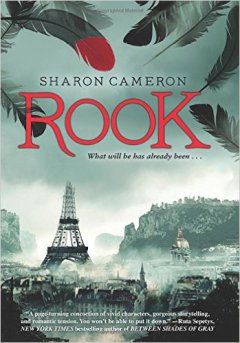 Written by Sharon Cameron, Rook is depicted in a futuristic setting, though how far in the future I cannot ascertain. It's tagline on the cover states, "What will be has already been." This is very fitting for the book as a whole for a few reasons. The first is that the book jumps from England's coast to France's, Paris to be more specific, and describes the power struggle between those that have and those that do not. This struggles has gotten so intense, people are killing those who have means and money just because, you know, they have it. If you are thinking this sounds like the French Revolution, good for you for catching my drift and knowing your history. (If you didn't think the French Revolution, we still love you.) What makes it a futuristic setting, though, is that the Revolutionaries are in charge, and in many cities and countries, they have abolished the use of technology. All technology. Even lights and clocks. Their reasoning behind this is simple: machines can do the jobs that the lower class citizens do, therefore, the citizens will be out of work and unable to survive. We know it is in the future, though, because some of the wealthy have become collectors of things from the past, like bottles, and they will pay extra for the ones with the mysterious word "diet" on them. While they do have to hide their contraband, they still enjoy possessing a piece of the past. So while the Revolutionaries (they are not called that in the book, but getting into their cult like behavior is better just read instead of explained) are jailing and executing those wealthier and more fortunate, there are a band of heroes attempting to help the prisoners escape. If you are thinking, "Hey, that sounds like The Scarlet Pimpernel that Mrs. P made us read," again, you would be correct! But Cameron doesn't steal the plot of The Scarlet Pimpernel, it is more like a nod of appreciation, going so far as to name the main character's pet St. Just in reference to the characters of the first book. They books differ because we know who our hero is from the beginning, we just don't know who she can trust. Oh, and yea, the hero is a girl. Pretty awesome. It is a book of intrigue and deception, of cat and mouse and strategy, and of good fighting evil. I recommend it for all, and it is in our library. I lumped these two entries together because both are books by Christopher Pike. When I was in middle school, these books were flying off the shelves of the library. Kids my age were obsessed with R.L. Stine's Goosebumps, the books, not so much the show, but they were more so for elementary school kids. Christopher Pike's books were what you read after you outgrew R.L. Stine. I selected two books at random from our library's shelves: Chain Letter and See you Later. The latter was more science fiction than "horror", but you still had to figure out who the antagonist was and what he or she was going to do. See You Later begins with Mark, a computer game programmer who has limited family involvement and little athletic promise due to a heart murmur, trying to gain the friendship and interest of a girl named Becky. They have both just graduated from high school, but the summer doesn't go how either of them planned when some new friends enter the picture and make Mark question his talent and his purpose. These new friends are where the science fiction aspect of the story comes in, but I won't ruin that for you.
Chain Letter is more of the Christopher Pike that I remembered from back in the day. A group of friends start being stalked by someone that knows their darkest secret. This person seems out to destroy their chances at success, forcing them to fail tests, lose races, and ruin performances, but to what end? The group has to question who could know, which among them can they trust, and when will it all end. Certainly a cheesy read, though I don't remember thinking so when I was in middle school. It reminded me of an old school horror movie, the kind that doesn't really scare you, but you are intrigued none the less, so if you are into that sort of thing, investigate the Christopher Pike selection in our library. We have quite a few. 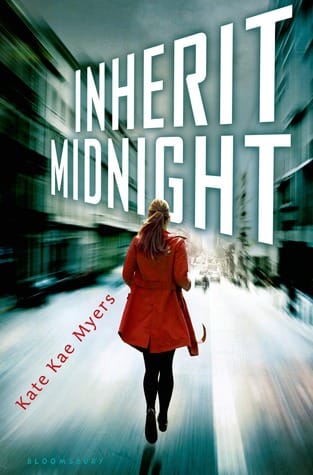 By Kate Kae Myers, Inherit Midnight follows seventeen-year-old Avery VanDemere on a quest for both freedom and family. It is hard to talk too much about the book without giving the plot away, but the gist is that Avery was raised by her wealthy but rather aloof grandmother who had certain expectations for her family members. When Avery disappointed her, Avery was sent away to a boarding school, that was really rather more like a prison. She kept trying to call her grandmother to beg forgiveness, to no avail. Then out of the blue, Avery is sent for by her grandmother, or rather, her grandmother's lawyer, to meet with her grandmother. So is every one else in the VanDemere family, much to Avery's chagrin, as her cousins and uncles are awful to her. Come to find out, the grandmother has set up a challenge for the family inheritance, an extremely significant amount. This challenge focuses on strong character traits and family history, things that Avery's grandmother has tried to instill in her brood without much success. It is kind of like crossing one of those reality TV shows, like Survivor or The Amazing Race, with the National Treasure movies. If Avery wins, she will be set free from her prison school and can live her life as she would like, not as her domineering grandmother would, but if she looses, she may end up with less than what she began with. I read this book pretty quickly; the different challenges from the grandmother keep the plot moving forward at a fast pace, and the drama going on in Avery's personal life is also a driving force (there is a decent amount of drama). Additionally, the main characters are people that are easily likable. Avery is a teenager just looking for a taste of independence, but also wanting to understand what and who she comes from. Her "team mate" Reilly doesn't shy away from trouble, but at the end of the day, he still wants to make his dad proud. Overall, it was a good read, despite the awkward dialogue at times. It certainly wasn't the best book I have ever read, but it did entertain me for a bit, so we will call that a success. It is a book that readers of all varieties could enjoy, and it is in the library. 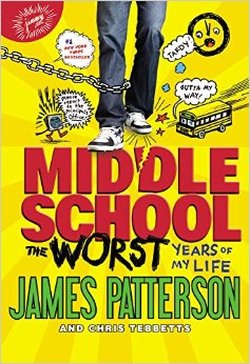 Oh, come now; they aren't so bad, are they? Written by James Patterson and Chris Tebbetts, this novel follows a 6th grade student named Rafe, his friend Leo, his crush Jeanne, the school bully Miller the Killer, and more. Rafe is your average kid with an uncomfortable living situation; much like he is trying to find his way at home, he is also just trying to find his place in the school. Leo has convinced him to partake in Operation Rafe; what this means is that Rafe is going to break EVERY rule in the school handbook. They even have a scoring system in place. Things get complicated, though, when Rafe's mom becomes disappointed in him, when his grades begin to deteriorate, and when Miller the Killer finds Rafe's notebook with Operation Rafe detailed and blackmails him. The book is entertaining and very easy to read. It has very recently been released into theaters as a movie, and it also has a cycle of books behind it, so if you enjoy this book, there are more to keep you occupied. Audiences of all kinds can enjoy this book, and we have it and many of the others in the school's library. Beginning with A Great and Terrible Beauty, this trilogy centers around a freshly turned sixteen-year-old girl who has recently lost her mother and been forced to transition from life in India to a boarding school in England. The best way I can describe this is like if Mean Girls was set in Victorian England at Harry Potter's Hogwart's Academy. I say this because Gemma is slowly learning about her mother's secret past: that of a sorceress in the most powerful coven ever, The Order. Needless to say, Gemma is severely irritated and disappointed that her mother never bothered to share this information with her, and now, unfortunately, it is too late for her mother to impart any guidance. Having no one to turn to for help, Gemma decides to share her secrets, and eventually her magic, with a small group of friends. They are amazed at the possibilities this new world, called the Realms, can bring to their fingertips, but are also enamored with the power that magic can provide. Each girl has a situation they would like to be expelled from: Ann is penniless and unwanted. Her life after school involves becoming a governess for her cousin's children. Felicity has powerful and well respected father, but a mother who has brought shame to their family. All is not as it seems in her family, and she wants power over her own life and identity. Pippa's family is at risk of losing their wealth and title in society, unless, of course, they marry her off to the highest bidder. And Gemma just wants life to go back to normal. These desires for change put Gemma in a bad situation, because she holds the magic, and therefore, the power.
Other conflicts arise as well, though. The magic in the realms has been absent for decades, until Gemma's arrival. Things are shifting in the realms, changing in unpredictable, sometimes dangerous ways. Gemma doesn't know who to trust or what to do. The trilogy offers a new antagonist in each novel; oftentimes, you do not know exactly who it is until closer to the end. The books (A Great and Terrible Beauty, Rebel Angels, and The Sweet Far Thing) offer an interesting perspective on magic, as well as a conversation of Victorian life for a young girl; Gemma is often frustrated that the topics that girls are forced to study and discuss are nothing more than fluff- she has real problems, but they are painting still lifes and talking about tea parties. As for a selected audience, I think this one is mostly for the ladies, and I would suggest 8th grade readers. Some of the family situations can get intense, so please keep that in mind. We have all three in our school's library. This is one of those times I judged a book by its cover. I saw shiny things and flowers and I thought, this is pretty and so it will be great. Not the case.
The Glittering Court is the first installment of what will be a series. Needless to say, I won't be reading further. I didn't hate the book, but it wasn't really what I expected. Set in almost colonial times, but in fictional England and fictional colonial America, the novel is centered around a girl named Adelaide; she has a fashionable title, and had her parents not made some poor choices with their money, she would have her choice of suitors, but she is broke, and options are limited. Adelaide's grandmother is out of property to sell, so therefore out of money, and Adelaide's only prospect is a distant cousin who is extremely boring and whose mother is extremely overbearing. Marrying him sounds about as appealing as having to count each individual strand of hair on your head. Adelaide finds an escape in The Glittering Court, though. This court takes servant girls, trains and educates them, teaches them about hair, fashion, and makeup, transports them to the new world (America-ish), and sells them off the the highest bidder. I know this was the plight of the female back in the day, but it is hard to stomach none-the-less. The drama of this book really unfolds in Adelaide having to keep her secret- no one can know that she is really a true and respected lady, not some random servant. Eventually, she comes across someone that knows, and she has to make some very difficult choices because of their knowledge. If I had to rate the book, it would maybe be a 3 out of 5 stars. Most of my struggle is really due to the poor treatment of women, not so much the book itself, though it ended with some political schemes brewing, so big stuff will probably happen in the sequels. I think only the ladies would enjoy it, but who knows. 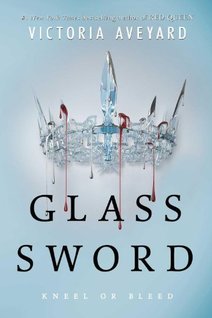 So this is the follow up to the entry from many months ago on The Red Queen. I didn't elaborate much on the plot in that entry, and I hope that didn't deter some from reading because, in my humble opinion, this series is awesome. The main character, Mare, is strong and independent; she is young but has already been dealt some difficult blows in her life. Her father suffers from an old war injury, adding to the family's already huge economical struggles. Mare herself will be joining the war effort, not because she believes in it, but because poor children are conscripted into the army. In the society they live in, the haves and have nots live very different lives are divided by much, but most specifically, blood color. Mare gets a very rare opportunity to escape conscription and live out her life at the castle, but this brings with it its own slew of troubles.First, she sees just how powerful the other half is- they have crazy X-Men like powers. Then, she realizes she has some powers of her own, with is unheard of, and the queen doesn't like it. This all occurs in the first book of the series. In The Glass Sword, Mare continues her fight for justice. She has her own army of sorts that is trying to end the conscription and the injustice set forth by the monarchy, but to be successful, Mare and her friends need a lot of other people like Mare, and finding them before the king and Queen is not easy. The books are awesome; the only bad thing is having to wait for the next installment! Also, I think everyone would enjoy this book. The protagonist might be a female, but this book is for more than just girls, very much like The Hunger Games books. 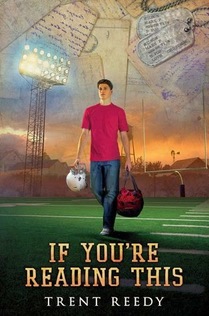 By Trent Reedy, If You're Reading This follows Mike Wilson, a teenager who lost his father when he was just seven. This forces Mike to become man of the house too early. He tries to help his mom around the house by cleaning up and watching out for his younger sister. As soon as he is old enough, he gets a job, and a good portion of his pay check goes toward household expenses. He has a bike that is barely hanging on, a mother that is overworked, overstressed, and severely over protective, and a kid sister who is in his business a bit too much. Mike works hard at school, then works hard at his job on a farm, and has very little time left to socialize and have fun. More importantly, his schedule leaves no time for football, a sport that he loved, that he shared with his father, but that his mother will not allow him to play. She fears he will be hurt or that he might let his grades slip. But then things change. Mike starts receiving letters from his father, who was killed in the war in Afghanistan. These letters impart wisdom that Mike's dad wants him to know, and each one comes with a challenge, something that will help Mike to become the young man his father hopes he will be. Mike is so amazed to get to hear from his dad, but this does lead to complications. For one, his dad is telling him to do things that his mom will not allow Mike to do. For example, football is something Mike's dad encourages him to do, but that Mike's mom forbids. Aside from conflicting parental advise, though, these letters bring up questions about Mike's parent's relationship, about his father's death, and about who is sending these letters now, after all this time. There is a lot of information about football, and about what Mike's father's day to day life as a soldier was like. Also, the book incorporates a large discussion of the struggles of growing up, which you all can relate to. Overall, it was a pretty good book. There were times that I felt the dialogue was not believable for a teenage boy, but this is set in Iowa, and as I have never lived in Iowa or been a teenage boy, perhaps I am not a good judge of the authenticity of the language. You make the call for yourself. We have this book in the library. |
Note From Ms. PIt will probably come as no surprise that I am an avid reader. I have also been spending a lot of time in the Dawn Hodges Library here at WAAS evaluating what books we can add to have students really READING. Some of you already read on your own, which is great because reading opens your mind to new ideas and possibilities you might not otherwise think of. It helps you to imagine and live in a new world for a little while, which is something we all need sometimes. Archives
February 2019
Categories |
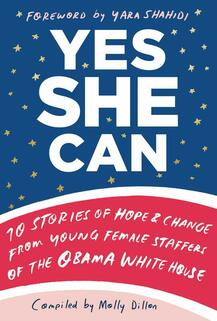
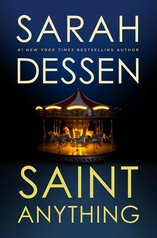
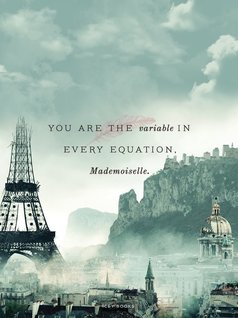
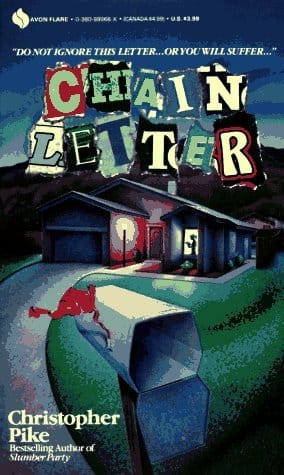
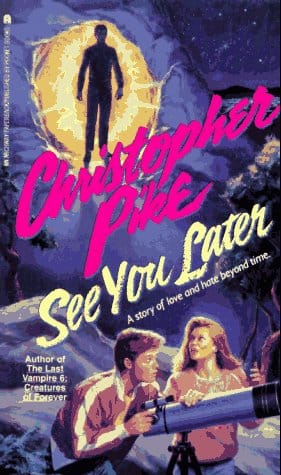
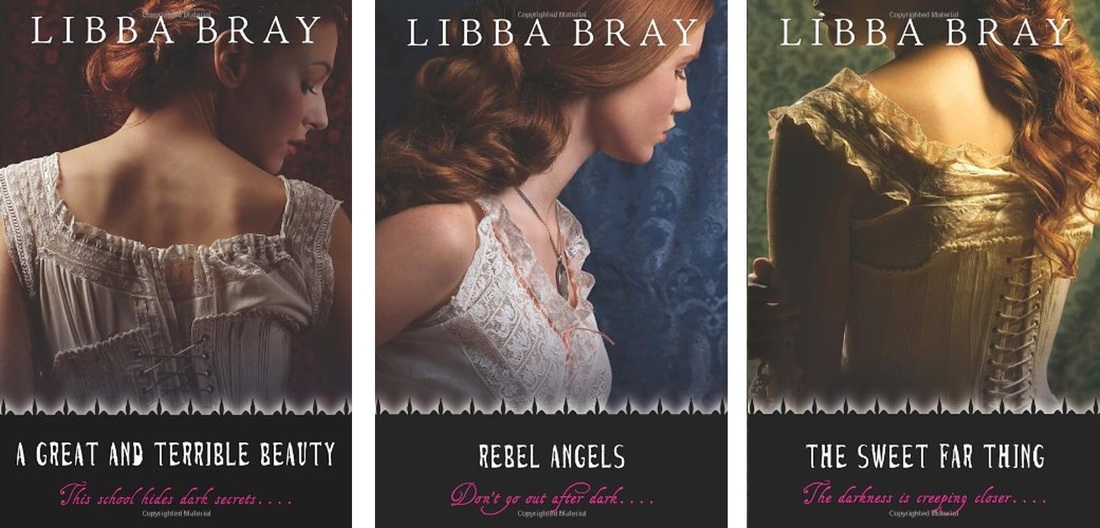
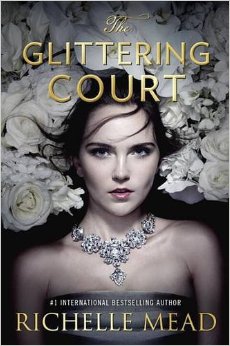
 RSS Feed
RSS Feed
